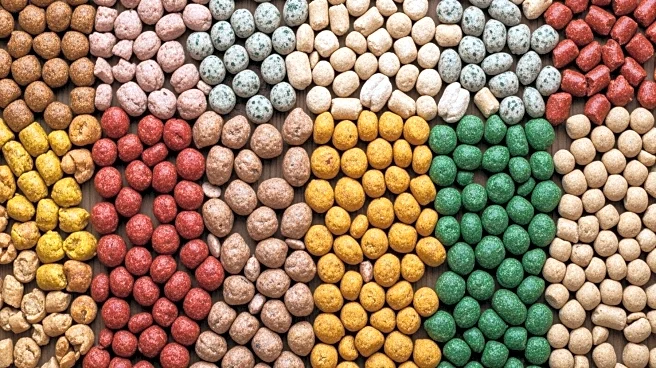What's Happening?
The global feed additives market is projected to grow significantly, reaching USD 59.88 billion by 2029, according to a report by MarketsandMarkets. This growth is driven by increasing demand for high-quality
animal nutrition and sustainable farming practices. Feed additives, which include essential nutrients like vitamins, minerals, amino acids, enzymes, and probiotics, are crucial for enhancing feed quality, promoting animal health, and improving productivity. The market is witnessing a shift towards natural feed additives derived from plants, herbs, fungi, and essential oils, as consumers prefer organic and antibiotic-free animal products. Innovations such as Kemin AquaScience's Pathorol for shrimp feed and Amlan International's mineral-based additives for poultry and livestock are examples of the industry's move towards sustainability.
Why It's Important?
The expansion of the feed additives market is significant for the agriculture and animal husbandry sectors, as it aligns with the growing consumer demand for healthier and traceable animal products. The shift towards natural additives reflects tightening regulations on antibiotic use, promoting alternatives that support gut health and growth performance without compromising animal welfare. This trend is expected to enhance the efficiency and sustainability of animal farming, benefiting both producers and consumers. The market's growth also presents opportunities for innovation in feed formulation and environmental impact reduction strategies, contributing to the overall sustainability of the agriculture industry.
What's Next?
As the demand for protein products continues to rise globally, feed producers are likely to focus on developing nutrient-rich formulations that enhance livestock health and performance. The liquid form segment of feed additives is expected to gain prominence, driven by innovations that improve production efficiency and feed quality. Additionally, the European market, with its varied trends in feed production, presents opportunities for high-quality, sustainable feed additives that align with regional sustainability regulations. Manufacturers may continue investing in research and development to create next-generation enzymes and nature-inspired probiotics, transforming animal nutrition into a smarter, cleaner, and more sustainable ecosystem.
Beyond the Headlines
The feed additives market's growth highlights broader implications for global food security and environmental sustainability. As manufacturers develop feed solutions that are nutritionally optimized and environmentally responsible, the industry contributes to reducing the ecological footprint of animal farming. This shift towards sustainable practices may also influence consumer behavior, encouraging more ethical consumption patterns. Furthermore, the market's expansion could drive technological advancements in precision agriculture, enhancing the efficiency of feed production and distribution.










